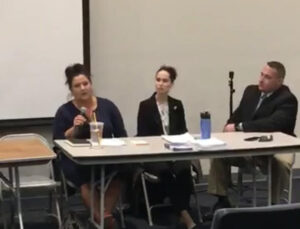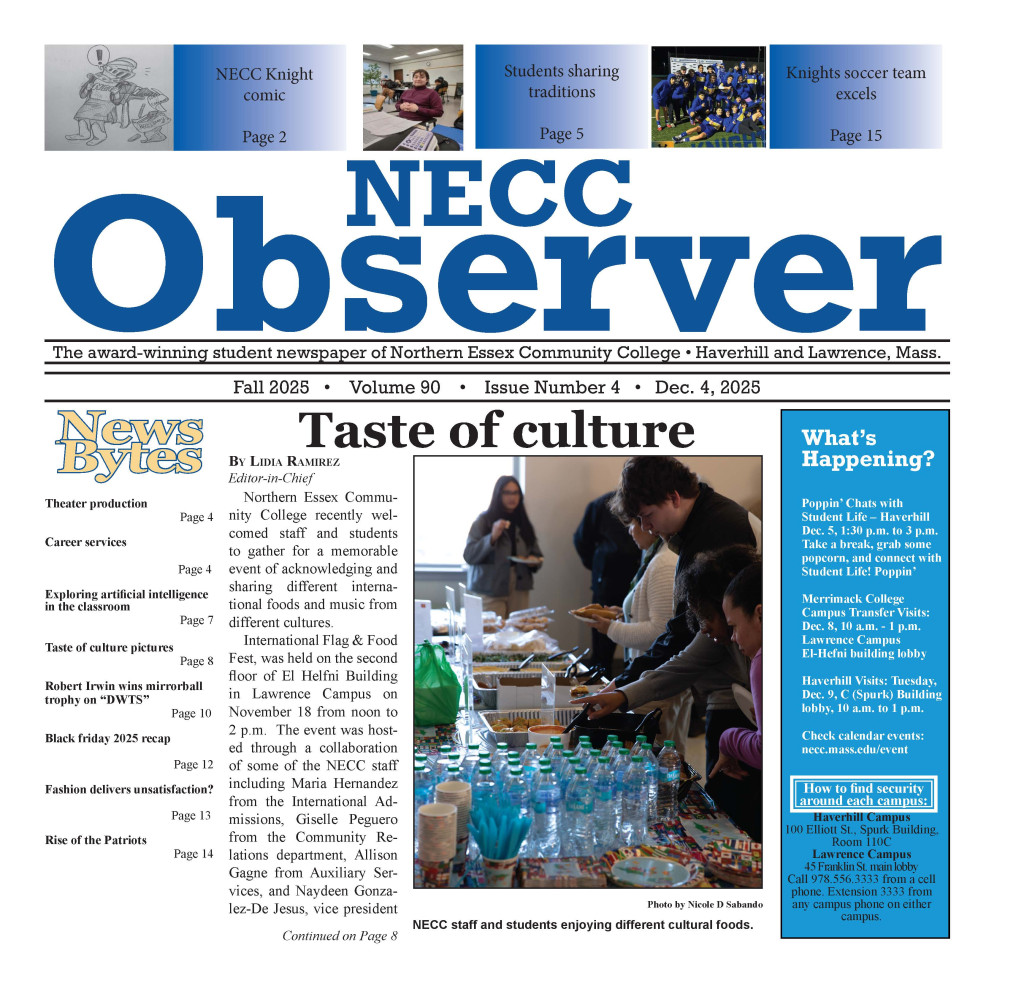Three speakers talked about prevention and assistance for victims
April is sexual assault awareness month and NECC welcomed three guest speakers on April 4 in the C building, lecture hall A, to talk about how the issue of sexual assault can affect us here on campus and what Northern Essex can do to help victims. Denis Champagne of the Amesbury Police Department, Kate Sanzo, the Adult Counselor and Outreach Speaker at YWCA, and Liz Trelegan the Title IX Investigator here at Northern Essex. The event began with a reminder that, according to Rainn.org sexual assault occurs every 98 seconds and that the intention for events like these is to encourage reporting and to give victims ready access to every resource available to them. The panelists talked about what consent is and Trelegan, the Title XI Investigator here at NECC, offered up the famous YouTube video “Tea and Consent,” which likens asking for consent for sex to be treated with the same rules as when you ask someone if they’d like tea.

“Northern Essex’s policy of consent is defined as informed, voluntary, and mutual and it can be withdrawn at any time,” says Trelegan. Kate Sanzo, the Adult Counselor and Outreach Speaker at the YWCA says that “consent has no gray area. “It’s Important to know that silence is not consent,” says Sanzo. She says they are moving from teaching “no means no” to a “yes means yes,” approach. Denis Champagne is a detective that works onsexual assault crimes for the Amesbury Police department, his mother also worked for the Salisbury Police Department for 20+ years investigating these crimes. Champagne’s concern is how sexual assault maintains being “one crime that’s still so underreported,” he says. Champagne says, “that’s why conversations like this are so important, we’re trying to open up doors (for survivors), this is not an easy conversation for anybody.”
Champagne’s training and relevant experience allows him to remove the “taboo” stigma surrounding sex crimes and he says he wants survivors to be able to come to him for help. “Are barriers coming down? They are,” he says, regarding the ways the police department has progressed in handling these crimes over the years. “Being open and available and having these conversations — being more visible,” is what helps bring in more victims willing to report, he says. When it comes to getting help for the victims Champagne says that “maybe the best thing for that victim isn’t prosecution.” He says that he’s ready to go at all times, in terms of prosecuting an abuser but he understands that avenue can be scary to victims. “I’ll do whatever you want, but you gotta talk to me,” says Champagne. His abundant resources and connections with various programs and groups are designed to help survivors even if they don’t want to report, he says. Champagne says that he can help with covering basic needs like shelter, food, childcare, transportation, even legal advice.
“Make them better today than they were yesterday,” he says. “My job is to do no harm, be there for them, and put them in contact with whatever agencies I can”, he says. Champagne says that these crimes are the biggest invasion to a human and that if he “can help a survivor get their life back, it’s the greatest reward in (his) field.” Sanzo works for the YWCA as a counselor and speaker. Sanzo says “the portrayal of mostly female victims (in the media) does significantly work against different members of our community” mainly victims that identify as LGBTQ or male. Which she notes as part of the reason for underreporting. Sanzo is part of a trained crisis intervention team, which operates as a 24-hour hotline to be available to victims constantly. Sanzo says they can aid in the process that comes with reporting, like being their moral support at the police station or at the hospital. “We can’t intervene, but we can be in the victim’s sight and just offer that comfort and that peace that they do have people on their side,” says Sanzo. Sanzo says they can also refer lawyers, offer weekly or monthly check-ins, assist with emergency housing, along with workshops and trainings which aid in prevention.
When it comes to the process of reporting at NECC, Talgente says anyone can file a formal complaint, but it’s not a necessity for her to begin an investigation. Legally if she’s made aware of an allegation, even verbally, she and her department have to act. “We can provide the student with resources available in the college”, says Talgenete about NECC students that are survivors of sexual assault. NECC offers escort services, schedule accommodations, absence accommodations for court dates or medical appointments, they can even help if you’re suffering because of long-term absences says Trelegan. NECC also offers free mental health services on both the Lawrence and Haverhill campus. When reviewing cases where the perpetrator is a student, Talgente says they don’t look for violations of the law, but rather violations of NECC policy. So, they will use any and all evidence brought to them like texts or emails, but they cannot subpoena phone records says Trelegan. “We’re very open to hearing what students need and working around that,” says Trelegan. “We don’t want people to leave school. We want them to stay and be successful and we want a safe environment, so we try to make accommodations for people to feel safe,” says Trelegan.

